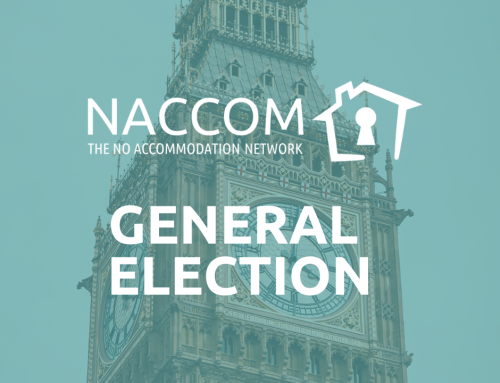Suella Braverman has stirred up outrage over comments to a Holocaust survivor. NACCOM’s Director, Bridget Young, considers the role that housing plays for people seeking asylum now, and how things could be better. This piece first appeared in Inside Housing in January 2023.
“Suella Braverman found herself in the spotlight again after footage emerged of an exchange between the home secretary and Joan Salter, an 83-year-old Holocaust survivor in Hampshire. The clip, shared by the charity Freedom from Torture, has been viewed more than five million times.
Ms Salter challenged Ms Braverman on her use of inflammatory language to describe migrants attempting to cross the Channel, likening it to the dehumanising language used by the Nazis. During the exchange, Ms Braverman clearly stated that she would not apologise for language that demonstrates “the scale of the problem”, as she sees it.
Meanwhile, the government is ignoring the real problems facing asylum seekers. There is just so much to address when it comes to the very complex issue of immigration and, in particular, desperate people needing to make dangerous journeys to reach safety in the UK, that it’s hard to know where to begin. But let’s try.
To start moving towards workable, humane, long-term solutions, we need to be talking about infrastructure, integration, community, legal aid, capacity, trauma, employment, health care, safety – and, of course, housing.
It’s clear that the asylum and immigration system needs reform, as do the wider systems – housing, health, education, policing – supporting our communities. But we are not able to talk about all of these things because the government seemingly lacks the political will to truly and meaningfully grapple with this issue.
We know from the work of our frontline member charities that decent housing – and the safety and stability it provides – plays a key role in enabling and empowering people to successfully resolve their asylum case or immigration status”
At the No Accommodation Network (NACCOM), our focus is housing and support for people in the asylum and immigration system who are experiencing destitution. You can’t separate this issue from the wider topics mentioned above. A refugee’s housing journey will be severely and negatively impacted if they do not have appropriate legal support or trauma-informed care at the right time to progress their asylum claim.
Indeed, we know from the work of our frontline member charities that decent housing – and the safety and stability it provides – plays a key role in enabling and empowering people to successfully resolve their asylum case or immigration status. In other words, a person’s housing journey is dramatically improved if integration is prioritised from the outset.
But, for a moment, let’s suspend reality and look solely at housing, and in particular the issues of affordability, availability and conditions.
We know that we need to get a grip of housing in this country. What housing is being built? What can people access and where? At what cost? Where are the purported improvements in tenants’ rights? After the tragedies of Grenfell Tower and the death of Awaab Ishak, why are we still negotiating about the need for improved and robust property standards and management?
For many people, much of the blame lies at the feet of commercialisation. This plays out heavily in the asylum sector too, where huge amounts of money go to private contractors delivering temporary or dispersed asylum accommodation, with conditions in this accommodation often dire and not effectively managed. The continued over-reliance on hotels as asylum accommodation, as well as the rehousing of people supported through the Homes for Ukraine scheme, are clear indications that the government has yet to fully grasp the housing pathways that people in the asylum system need.
There are effective, practical ways to deal with these housing issues, as well as systemic solutions to overhaul them. The refugee and immigration sector can and should be part of those conversations.
Huge amounts of money go to private contractors delivering temporary or dispersed asylum accommodation, with conditions in this accommodation often dire and not effectively managed”
Would it not be better to see shared pathways to affordable housing – temporary and permanent, social and private – being managed strategically and collectively within communities and localities?
Taking a collective approach allows for better management of standards and reduced competition for a scarce resource, while allowing different partners to work to their strengths. That may be the local authority having oversight of the availability of affordable housing in their area; a social lettings agency procuring and managing properties; environmental health officers overseeing property standards; housing associations offering access to housing and community services; voluntary and statutory organisations working with groups of people they have the expertise to support; and tenants and landlords having a forum to address issues.
Of course, this collective and community-based approach would not solve all the UK’s housing problems. But it would manage existing affordable housing better, minimise competition and the incentive to put profit over people, and create an even clearer picture of the structural and systemic need for change. In turn, this would allow the asylum and immigration sector to be part of the solution, moving closer towards ensuring that everyone in the UK can access a decent, affordable home.”




